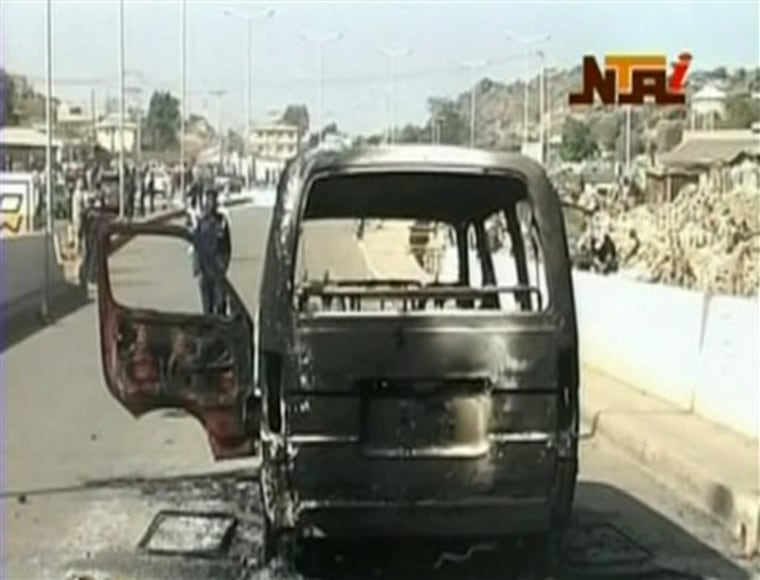Six people were arrested for violence that killed at least three people and wounded dozens in Nigeria's central region over the weekend after multiple blasts killed at least 32 in the deeply divided city of Jos, police said Monday.
Angry youths barricaded roads Sunday morning and attacked people passing by. Houses and a truck also were set ablaze. Military patrolled the streets of Jos that were calm Monday and security officials cordoned off the areas where the violence had erupted.
The secretary of the Red Cross in Nigeria's Plateau State, Manassie Panpe, said 127 people were wounded from the blasts Friday night and from renewed violence over the weekend. Officials Saturday said that at least 74 people were hurt in the blasts.
Plateau state police chief, Abdurrahman Akano, on Monday said that three people had been killed in Sunday's violence and that six people had been arrested for allegedly participating in the street violence.
Akano said no arrests have been made in connection with the multiple explosions in Jos on Friday.
"We are still investigating," he said.
It was not immediately clear if those attacks had a religious motive. Two of the bombs went off near a large market where people were doing last-minute Christmas shopping. A third hit a mainly Christian area of Jos, while the fourth was near a road that leads to the city's main mosque.
Also Friday, members of a Muslim sect attacked two churches in the northern city of Maiduguri, killing at least six people. Police have not said whether they believe the bombings were related to the church attacks. The two areas are about 320 miles (520 kilometers) apart.
The United Nations spokesman's office said Secretary-General Ban Ki-moon condemned the violence in Nigeria "especially at a time when millions of Nigerians are celebrating religious holidays."
Nigerian President Goodluck Jonathan has expressed his sympathy to the victims' families and said the government will bring the perpetrators to justice.
"I assure Nigerians that government will go to the root of this," he said of the explosions. "We must unearth what caused it and those behind it must be brought to book."
Religious violence already has left more than 500 people dead this year in Jos and neighboring towns and villages, but the situation was believed to have calmed down before the weekend bombings. The explosions Friday were the first major attack in Jos since the state government lifted a curfew in May.
The curfew had first been imposed in November 2008 during postelection violence but it was extended in January following clashes between Christian and Muslim groups. More than 300 people — mostly Muslims — were killed in the January violence in Jos and surrounding villages.
Nigeria, a country of 150 million people, is almost evenly split between Muslims in the north and the predominantly Christian south. The blasts happened in central Nigeria, in the nation's "middle belt," where dozens of ethnic groups vie for control of fertile lands.
The violence, though fractured across religious lines, often has more to do with local politics, economics and rights to grazing lands. The government of Plateau state, where Jos is the capital, is controlled by Christian politicians who have blocked Muslims from being legally recognized as citizens. That has locked many out of prized government jobs in a region where the tourism industry and tin mining have collapsed in the last decades.
Police and the army have declined to identify suspects in the Jos bombings, and state governor David Jang would only say "we believe some highly placed people masterminded the attack." Authorities, though, already have blamed the radical Muslim sect Boko Haram for the Christmas Eve church attacks.
The radical Muslim sect, whose name means "Western education is sacrilege" in the Hausa language, was thought to be vanquished in 2009. Nigeria's military crushed its mosque into concrete shards, and its leader was arrested and died in police custody.
But now, a year later, Maiduguri and surrounding villages again live in fear of the group, whose members have assassinated police and local leaders and engineered a massive prison break, officials say. Western diplomats worry that the sect is catching the attention of al-Qaida's North Africa branch. It remains unclear what, if any, formal links al-Qaida in the Islamic Maghreb has made with Boko Haram.
___
Associated Press writer Njadvara Musa in Maiduguri, Nigeria contributed to this report.
